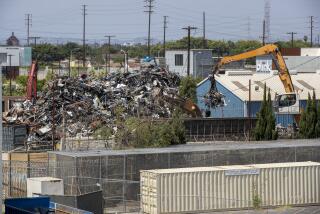U.S. Suspends Recycling of Radioactive Scrap
- Share via
Reacting to fears about low-level radioactive material that is recycled into consumer goods, the U.S. Department of Energy on Thursday suspended the release of scrap metals from its nuclear weapons facilities.
Energy Secretary Bill Richardson said the ban will remain in effect until the department establishes a new policy aimed at ensuring that there is “no detectable” radioactivity in metals that are sent to recyclers. Until now, the department’s policy allowed the metals to contain low levels of contamination.
For years, metals and other waste from the nation’s nuclear facilities have been routinely sent to scrap dealers and landfills, and recycled into products such as construction beams, silverware and cars.
Much of the concern about the recycled waste centers on Santa Susana Field Laboratory above Simi Valley, operated by Boeing’s Rocketdyne Division.
Boeing spokesman Daniel Beck said the Energy Department’s decision probably will slow down and increase the cost of a major cleanup of radioactive soil, concrete and other material at the Santa Susana facility. The cleanup, so far costing $60 million, is being conducted by Boeing but paid for by the U.S. government.
“We’ve made a commitment to the community that we would get this cleanup done in a timely and thorough manner. This slows it down, so naturally we’re concerned about that. But we’re committed to complying with all of the regulations,” Beck said.
Environmental groups and labor unions had complained that the Energy Department was not adequately screening the recycled waste.
Daniel Hirsch, president of Committee to Bridge the Gap, a nuclear watchdog group, called the decision “a tremendous victory for all those who have fought to prevent radioactive waste from ending up in consumer goods such as spoons, frying pans, jewelry, zippers and automobiles.”
Hirsch, added, though, that the details of the new policy are yet to be determined. He fears that it will not be broad enough to encompass all contaminated materials, rather than just metals.
For example, the Santa Susana facility has been sending low-level radioactive soil and building debris to landfills.
A senior Energy Department official said Thursday that the temporary ban, and a new permanent policy, will apply only to recycled metals because there is more of a potential for the public to be exposed to them than to materials taken to landfills.
Officials at the Energy Department say their old policy limited recyclables to low levels of radioactivity, less than the dose in a chest X-ray.
But Richardson acknowledged Thursday that consumers need to be ensured that the waste has no radioactive residue at all.
“The suspension will remain in effect until our sites confirm that they meet this new more rigorous standard,” he said in a statement.
The new policy, still in development, is expected to be put into place by December.
The costs of disposal could surge for Rocketdyne and other facilities because mildly contaminated materials may have to be sent to special dumps licensed for radioactive waste disposal instead of commercial recycling centers and regular landfills. Highly contaminated waste is sent to special dumps in Washington state, Utah and Nevada.
But Energy Department officials say the costs may not increase because the agency hopes to find alternative ways to dispose of the materials without sending them to the special dumps. For example, the department is launching a study to see if scrap can be recycled into waste containers used by the federal agency.
Recyclable objects from defense facilities alone are expected to grow to over 1 million tons over time.
Beck said the Rocketdyne facility now has no scrap metal waiting to be shipped off-site, so the ban will have no immediate effect on the cleanup.
Rocketdyne has shipped its lightly contaminated material to a Terminal Island metal-processing and export company, a private ranch in Ventura County and landfills in the San Fernando Valley and Kettleman Hills in the Central Valley. In at least two cases, the recipients said they were unaware of the nature of the waste they received.
Rocketdyne officials said the materials met a government guideline of posing a risk of less than one cancer case per million people exposed. Environmentalists, however, say the added risk, although small, is avoidable and that all the material should be subject to firm standards.
The ban on recycling the scrap metal applies only to Energy Department facilities, not commercial nuclear power plants regulated by the Nuclear Regulatory Commission.
More to Read
Sign up for Essential California
The most important California stories and recommendations in your inbox every morning.
You may occasionally receive promotional content from the Los Angeles Times.













